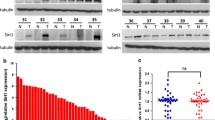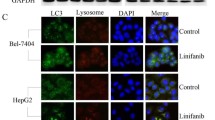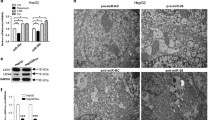Abstract
ATG4D, a member of autophagy-related protein 4 (ATG4) family, plays an interplay role between autophagy and apoptosis in cancers. However, the role of ATG4D in hepatocellular carcinoma (HCC) has not been defined. Herein, this study aimed to investigate the role and the underlying mechanism of ATG4D in regulating HCC cell apoptosis. ATG4D was silenced in MHCC-97L HCC cells, and then cell proliferation and apoptosis were examined. ATG4D expression was significantly upregulated in HCC tissues when compared with paired non-tumor tissues. In vitro assays revealed that silencing of ATG4D significantly suppressed cell proliferation, promoted cell apoptosis, and enhanced sensitivity to cisplatin of MHCC-97L cells. Furthermore, silencing of ATG4D decreased the phosphorylation of Akt and increased the protein level of caspase-3. Taken together, ATG4D may play an oncogenic role in HCC progression. These findings suggest that ATG4D may serve as a therapeutic target for HCC therapy.





Similar content being viewed by others
Data availability
The data could be obtained upon request to the corresponding author.
References
Wallace MC, Preen D, Jeffrey GP, Adams LA (2015) The evolving epidemiology of hepatocellular carcinoma: a global perspective. Exp Rev Gastroenterol Hepatol 9:765–779. https://doi.org/10.1586/17474124.2015.1028363
Zuo TT, Zheng RS, Zhang SW, Zeng HM, Chen WQ (2015) Incidence and mortality of liver cancer in China in 2011. Chin J Cancer 34:508–513. https://doi.org/10.1186/s40880-015-0056-0
Grandhi MS, Kim AK, Ronnekleiv-Kelly SM, Kamel IR, Ghasebeh MA, Pawlik TM (2016) Hepatocellular carcinoma: from diagnosis to treatment. Surg Oncol 25:74–85. https://doi.org/10.1016/j.suronc.2016.03.002
Hsieh TC, Wu YC, Sun SS, Yen KY, Kao CH (2016) Treating hepatocellular carcinoma with (90)Y-bearing microspheres: a review. Biomedicine (Taipei) 6:19. https://doi.org/10.7603/s40681-016-0019-z
Yoo BK, Chen D, Su ZZ, Gredler R, Yoo J, Shah K, Fisher PB, Sarkar D (2010) Molecular mechanism of chemoresistance by astrocyte elevated gene-1. Cancer Res 70:3249–3258. https://doi.org/10.1158/0008-5472.can-09-4009
Liu G, Pei F, Yang F, Li L, Amin AD, Liu S, Buchan JR, Cho WC (2017) Role of autophagy and apoptosis in non-small-cell lung cancer. Int J Mol Sci. https://doi.org/10.3390/ijms18020367
Stordal B, Davey M (2007) Understanding cisplatin resistance using cellular models. IUBMB Life 59:696–699. https://doi.org/10.1080/15216540701636287
Booth LA, Tavallai S, Hamed HA, Cruickshanks N, Dent P (2014) The role of cell signalling in the crosstalk between autophagy and apoptosis. Cell Signal 26:549–555. https://doi.org/10.1016/j.cellsig.2013.11.028
Sheng J, Qin H, Zhang K, Li B, Zhang X (2018) Targeting autophagy in chemotherapy-resistant of hepatocellular carcinoma. Am J Cancer Res 8:354–365
Levy JMM, Towers CG, Thorburn A (2017) Targeting autophagy in cancer. Nat Rev Cancer 17:528–542. https://doi.org/10.1038/nrc.2017.53
White E, Mehnert JM, Chan CS (2015) Autophagy, metabolism, and cancer. Clin Cancer Res 21:5037–5046. https://doi.org/10.1158/1078-0432.ccr-15-0490
Betin VM, Lane JD (2009) Atg4D at the interface between autophagy and apoptosis. Autophagy 5:1057–1059. https://doi.org/10.4161/auto.5.7.9684
Betin VM, Singleton BK, Parsons SF, Anstee DJ, Lane JD (2013) Autophagy facilitates organelle clearance during differentiation of human erythroblasts: evidence for a role for ATG4 paralogs during autophagosome maturation. Autophagy 9:881–893. https://doi.org/10.4161/auto.24172
Xu Y, An Y, Wang Y, Zhang C, Zhang H, Huang C, Jiang H, Wang X, Li X (2013) miR-101 inhibits autophagy and enhances cisplatin-induced apoptosis in hepatocellular carcinoma cells. Oncol Rep 29:2019–2024. https://doi.org/10.3892/or.2013.2338
Tian J, Tang ZY, Ye SL, Liu YK, Lin ZY, Chen J, Xue Q (1999) New human hepatocellular carcinoma (HCC) cell line with highly metastatic potential (MHCC97) and its expressions of the factors associated with metastasis. Br J Cancer 81:814–821. https://doi.org/10.1038/sj.bjc.6690769
Lou M, Zhang LN, Ji PG, Feng FQ, Liu JH, Yang C, Li BF, Wang L (2016) Quercetin nanoparticles induced autophagy and apoptosis through AKT/ERK/Caspase-3 signaling pathway in human neuroglioma cells: in vitro and in vivo. Biomed Pharmacother 84:1–9. https://doi.org/10.1016/j.biopha.2016.08.055
Pan W, Li W, Zhao J, Huang Z, Zhao J, Chen S, Wang C, Xue Y, Huang F, Fang Q, Wang J, Brand D, Zheng SG (2019) lncRNA-PDPK2P promotes hepatocellular carcinoma progression through the PDK1/AKT/Caspase 3 pathway. Mol Oncol 13:2246–2258. https://doi.org/10.1002/1878-0261.12553
Song S, Tan J, Miao Y, Li M, Zhang Q (2017) Crosstalk of autophagy and apoptosis: involvement of the dual role of autophagy under ER stress. J Cell Physiol 232:2977–2984. https://doi.org/10.1002/jcp.25785
Gil J, Ramsey D, Pawlowski P, Szmida E, Leszczynski P, Bebenek M, Sasiadek MM (2018) The influence of tumor microenvironment on ATG4D gene expression in colorectal cancer patients. Med Oncol 35:159. https://doi.org/10.1007/s12032-018-1220-6
Zhang XM, Li HJ, Wang D, Li C, Chen Q, Li CL (2016) Expressions and clinical significance of autophagy-related genes ATG2B, ATG4D, ATG9B in breast carcinoma. Sichuan Da Xue Xue Bao Yi Xue Ban 47:184–188
Funding
This study was supported by Jiangxi Province Science Foundation for Youths (Award Number 20181BAB215007).
Author information
Authors and Affiliations
Contributions
Conceptualization, Methodology: WL, JZ, and XL; Experiments: WL, TL, BL, and YH; Validation: JZ and XL; Writing: WL; Project Administration: JZ and XL All authors reviewed and approved the paper.
Corresponding author
Ethics declarations
Conflict of interest
The authors declare that they have no competing interests.
Ethical approval
This study was approved by the institutional review board.
Additional information
Publisher's Note
Springer Nature remains neutral with regard to jurisdictional claims in published maps and institutional affiliations.
Rights and permissions
About this article
Cite this article
Zhao, JY., Li, XY., Liu, TD. et al. Silencing of ATG4D suppressed proliferation and enhanced cisplatin-induced apoptosis in hepatocellular carcinoma through Akt/Caspase-3 pathway. Mol Cell Biochem 476, 4153–4159 (2021). https://doi.org/10.1007/s11010-021-04224-z
Received:
Accepted:
Published:
Issue Date:
DOI: https://doi.org/10.1007/s11010-021-04224-z




